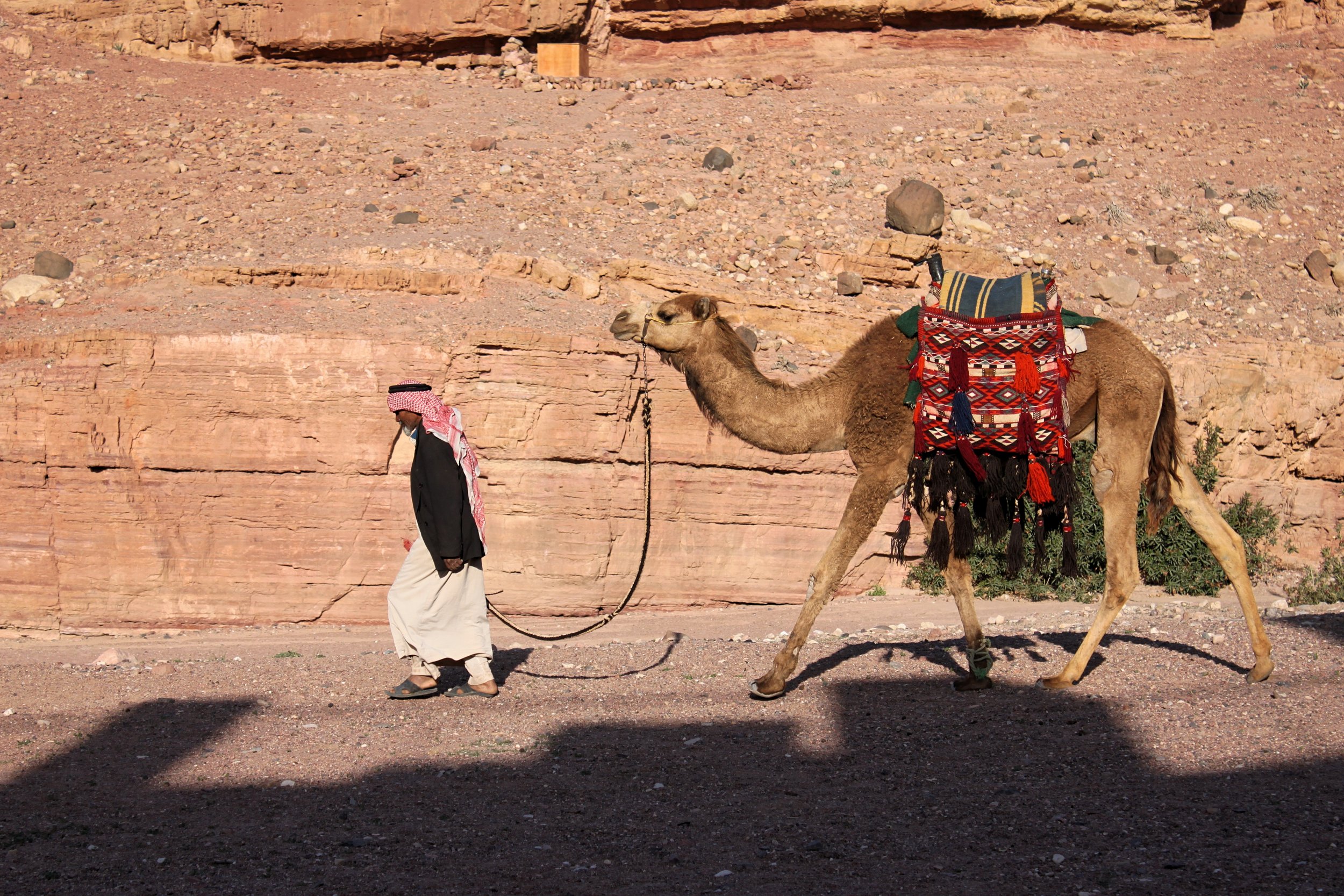The things I learned from sitting in a Bedouin tent
[This blog post was written in 2011.]
I’ve spent many evenings in tents, but in Jordan I spent an evening in a Bedouin tent, which is much different. I was staying off the grid in a fantastic eco hotel, the Feynan Ecolodge, in the desert of the Dana Biosphere Reserve, near the border with Israel.
After dinner, a small group of us were invited to the home of one of the local families who lives a few minutes walk away. The Bedouin are nomadic Arab tribes whose territory covers land from North Africa to the Middle East. They live in tent camps, although many Bedouin live in cities now.
Lighting our path by small flashlights, cell phone lights and the stars, we tread over the uneven path in otherwise darkness and silence. We don’t see the black tent until the path turns slightly to the right and a startling light bulb hoisted on a pole lights up the large square tent.
A gathering of seven male family members greet us with warm smiles and words of welcome. We sit down in a circle on well-worn carpets and are offered coffee, an important fixture of Jordanian culture.
We are told to take the small cup on offer with our right hand, drink a few sips, and either shake it to say “no more” or give it back to be refilled. It’s not polite to have more than three cups and if you set the cup down on the ground in front of you, it means you have an issue to deal with or talk about with your hosts.
We are served by a teenaged boy who pours two cups of coffee for the first two people in the circle. Refilling one, he offers the next cup to the person on his left. Around the circle he goes until everyone has had their coffee.
Next up is tea, which is liberally poured and doesn’t have the same procedure as coffee. Everyone gets their own glass and whenever it nears emptiness, one of the young men will come and refill it until you say, “la shoukran” (no thank you).
The men are gracious enough to answer question after question about their traditional way of life and culture. We learn that their most important values are honour, family and generosity, that their children now learn English in co-ed schools, and that the women of the family are currently concealed in a private room behind a flap in the tent. Women visitors may go in and spend time with them but the Bedouin women may not come out and sit with us.
A lot of our questions revolve around women and their role in this society, and we are told that men may have multiple wives, but it doesn’t bother the women at all. In fact, they sometimes help their husbands find new wives.
Our straight talking guide, Saleh, jumps in immediately to tell us otherwise, though. His family is Bedouin and he grew up in a nomadic lifestyle until he was eight years old. He remembers the women crying when they were by themselves. Because it is accepted that her husband can have another wife, she is often resigned to knowing that at some point he will seek one out. What can she do? Saleh says that some women decide it’s better to help him find someone they like and so will “help” him.
“It’s a man’s world,” he says gently.
Photo by Lori Henry.
For young people, marriage is a choice they can make, with their family’s approval. One of the young men here is about to marry his cousin, of their own choice, which is also common. A marriage contract is always drawn up and provides things like a home and provisions for the woman in case of divorce.
I notice that while we’re chatting, two teenagers in the back corner of the tent have a digital camera out and are taking photos of us. They giggle between themselves softly and keep snapping away, sometimes switching to video. I can only assume they’ll be showing them to their friends as soon as they get the chance.
We ask their fathers about how they see their culture changing in the behaviour of their sons and daughters. These days, some males don’t wear a headdress at all, especially teenagers. This the older generation finds sad but, “it’s a democracy, so what can you do?” As for the teenaged boys wearing jeans, American-style t-shirts and carrying cell phones? The men reply in the same resigned way: it’s sad, but it’s okay.
When we tell the men that they can ask us anything they’re curious about, their questions revolve around two issues: marriage and generosity.
They want to know the circumstances of men and women getting married in North America and what the marriage contract looks like. They seem genuinely concerned to learn that most people don’t discuss beforehand specifically what the woman will get if they divorce. We also tell them about the upswing in internet dating.
Most importantly, they wonder what we do if we notice that someone needs help. For them, they open their homes for as long as is needed without expectation of anything in return. We tell them that it’s not often that people will take a stranger into their home because they feel unsafe.
The men don’t even look surprised. I guess our answer confirms what they expected to hear.
Jordan book recommendations: Sex and the Citadel: Intimate Life in a Changing Arab World by Shereen El Feki and Pillars of Salt by Fadia Faqir.*
* The above links are to Amazon and are for your reference. I receive a small referral fee if you buy from Amazon. But I encourage you to buy books from any retailer, ideally your local bookstore!

